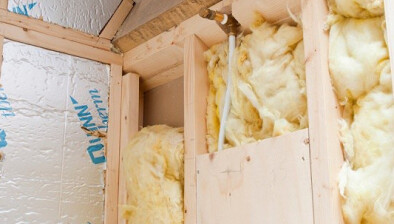Government urged to provide clarity and finance to support net zero goals

Ashley Campbell
CIH Scotland, the Federation of Small Businesses (FSB) in Scotland and Consumer Scotland have issued their responses to key government consultations on two key areas linked to the statutory target to meet net zero by 2045.
The Heat in Buildings Bill, expected to be introduced later this year, would set minimum energy efficiency standards for private rented and owner-occupied homes, and require the majority of homes across all tenures to move to clean heating system like a heat pump, or connect to a heat network by 2045. Views were also sought on a new Social Housing Net Zero Standard (SHNZS) which would replace the current Energy Efficiency Standard for Social Housing (EESSH2).
The Scottish Government’s Heat in Buildings Strategy published in 2021 estimated that the total cost of decarbonising our homes and buildings could reach £33 billion, although this will likely now be higher due to inflation. The SHNZS consultation document sets the cost to the social sector at £1.28bn for energy efficiency measures and £4.6bn for decarbonisation. So far, the Scottish Government has committed £1.8bn over the course of this parliamentary term.
Commenting on the consultations, Ashley Campbell policy and practice manager at CIH Scotland, said: “We believe that everyone should have the right to live in a good quality home that is affordable to heat, and we understand that the housing sector has a role to play in meeting net zero standards set by the Scottish Government. We welcome the move towards alignment of standards across tenures – people should be able to expect the same standards no matter who their landlords is, if they are a home owner, or getting ready to buy their first home.
“However, we do have concerns about the costs of meeting the proposals. The Heat in Buildings Strategy estimated that decarbonising our homes and buildings will cost around £33bn, and to date, the Scottish Government has only committed £1.8bn towards this over the course of this Parliamentary term.
“We also need to recognise that these proposals aren’t being put forward in isolation. The Scottish Government is preparing to update space and accessibility standards for social and private housing which will add costs to new developments, landlords face inflationary increases on maintenance and housing management services, and this is all coming during a cost of living crisis and housing emergency that will be exacerbated by the £200 million cut to the affordable housing supply budget.
“If we are to meet these challenging targets for energy efficiency and renewable heat without passing costs on to tenants and residents, we need urgent clarity from Scottish Government. They need to communicate new requirements to social landlords and the wider public as soon as possible, explaining what is required and the timescales involved. We need to see comprehensive advice and information and financial support for those who need it, and much greater focus on reducing the cost of electricity to ensure that renewable heat is an attractive and affordable option.”
The Federation of Small Businesses in Scotland has called on the Scottish Government to ensure its proposals for the transition to zero-emissions heating systems are designed with the needs of small firms placed front and centre.
Responding to the Scottish Government’s consultation on its proposed Heat in Buildings Bill, the small business representative body flagged concerningly low levels of awareness among its members over what they will be required to do.
FSB’s consultation response states: “It is incredibly important that a ‘one size fits all’ blanket approach is not applied to business and that specific consideration is given to how the legislation will impact smaller businesses … We strongly urge that, prior to implementing legislation, the Scottish Government develops a clear delivery plan which includes running pilot schemes and case studies with small businesses.”
FSB’s Scotland policy chair, Andrew McRae, said: “Scottish small businesses recognise that significant changes must be made over the next 20 years if we’re going to meet our net zero commitments. Indeed, they are supportive of government ambition in this area. However, what is currently missing is a clear idea of what support the government will provide to them in order to make this transition actually happen.
“Last year, almost a third (31%) of small businesses told us they had already taken actions to reduce their carbon emissions. But only a small proportion (7%) had made the move to a zero or low emissions heating system. Given almost two-thirds (62%) also told us they do not feel enough support is available to them to cushion the impact of the transition to net zero on their business, you can see why so many businesses are not yet sufficiently confident to spend lots of time and money overhauling their heating system.
“Indeed, one member told us during the development of our consultation response that they had recently installed a new heating system, but were unsure if it would be suitable under the Heat in Buildings proposals. They then went on to explain how difficult it had been to recruit a suitable tradesperson for the work.
“The net zero transition bill is predicted to run into several billions, but the government has so far only been able to commit to providing a small portion of that cost. But, at a time when small businesses are also facing the full force of economic challenges, not least through rapid hikes in costs and shrinking margins, it’s out of the question to expect them to bear the lion’s share of the costs themselves.
“The latest Businesses in Scotland data revealed that we lost more than 20,000 small firms last year – roughly the same amount lost during the first year of the pandemic. There’s a real concern that if the government does not provide adequate financial support alongside legislative obligations, that number will only increase over the coming years.”
Speaking to members in preparation of its consultation response, the small business group also heard concerns about gaps not only in the supply chain for materials but, crucially, in the existing and future skills supply chain.
Mr McRae added: “While it is good to see the Scottish Government set out its intentions in this document, there’s still not enough here to offer Scottish small businesses the certainty they need in order to make significant investment decisions. As a member of the New Deal for Business group, we have been clear that all proposed legislation must be subject to more extensive assessment in terms of its impact, particularly on small businesses, before it can be passed.
“That’s why we’re calling on the Scottish Government to rethink some of these significant proposals, and ensure sufficient support is made available for small businesses, financial and otherwise. Time is of the essence here. We can’t afford to risk the survival of those businesses which make up almost all our economy in a race to 2045.”
Consumer Scotland said it broadly supports the principles behind the proposals, however it has recommended consumers need appropriate incentives, support and information to engage with the transition to low carbon heating and more energy efficient buildings.
The body has also recommended further analysis of the impact of the proposals on individual consumers and small businesses before the Scottish Government reaches decisions on key aspects of the Bill in order to avoid any unintended detriment.
As the statutory body for consumers in Scotland, Consumer Scotland has offered to work with the Scottish Government to help deliver this.
Consumer Scotland welcomes the overall aims of the new Social Housing Net Zero Standard but has highlighted the potential financial impacts of proposals on tenants.
Chief executive of Consumer Scotland Sam Ghibaldan said: “These are significant proposals with substantial implications for consumers. We do not underestimate the challenge of decarbonising homes, nor the significant ask being made of consumers to help reach net zero by the end of 2045.
“This consultation is a major opportunity to increase the energy efficiency of buildings in Scotland. That will help achieve climate targets, lead to substantial health benefits and
lower energy consumption and potentially bills, all to the benefit of current and future consumers.
“Consumer Scotland would welcome the opportunity to engage with the Scottish Government as the Bill progresses to ensure that the impact on both domestic and non-domestic consumers is fully considered.”

















